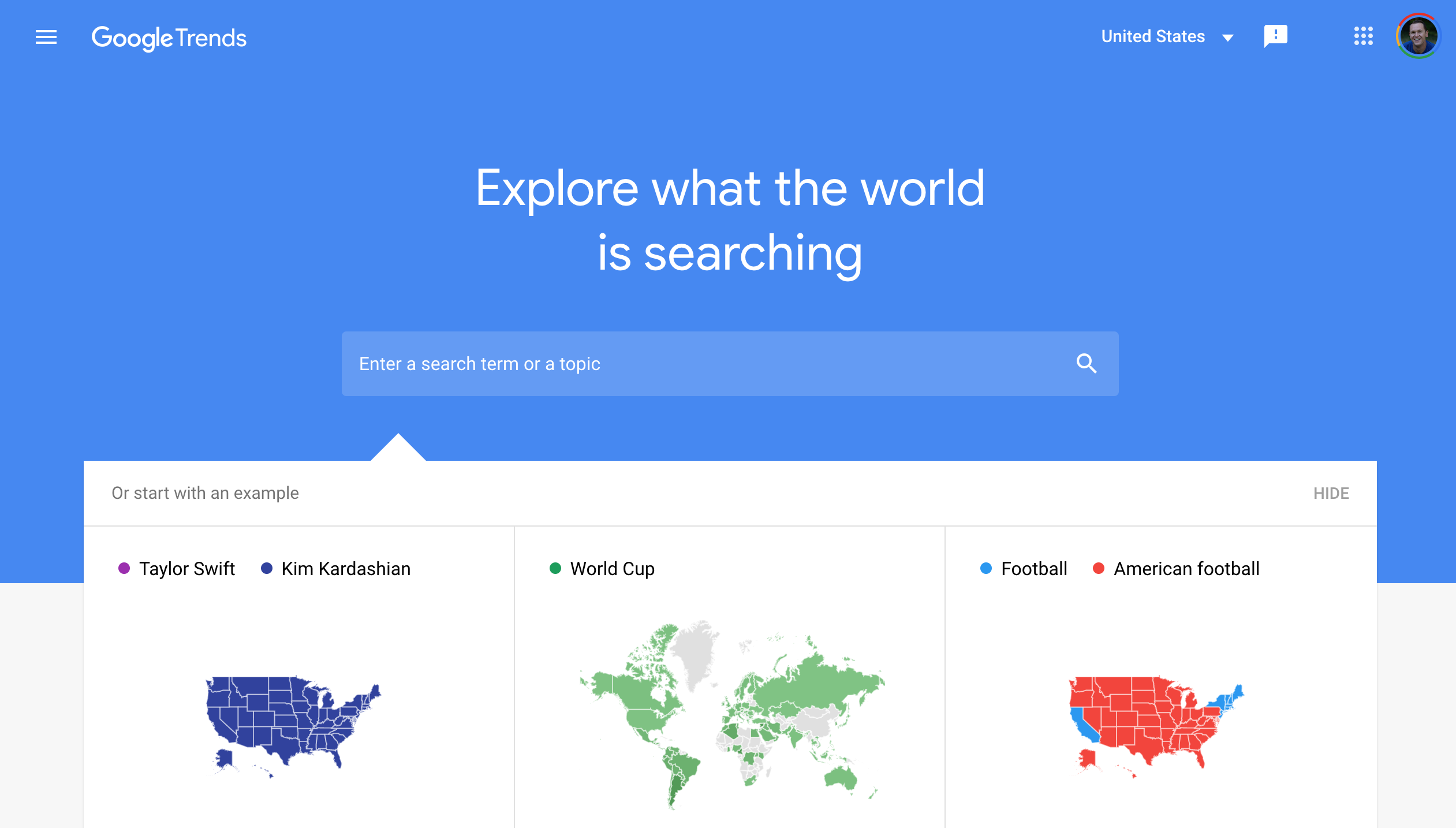3 Steps To Find Your Profitable Business Idea
Deciding which business to go for is an important decision because, most likely, you don’t want to put all your time and energy into something that isn’t going to last or be much fun for you.
Personally, I would much rather have a business that can grow with me and that is based around something I am passionate about, that I love, and that can make me money. If you feel the same way, you’re in the right place.
There is a caveat. I’m not going to help you grow a drop shipping business, or build an affiliate business, this process is for you if you want to turn your knowledge, passions, and skills, into a profitable online business.
You will learn:
- A step-by-step brainstorming method
- Proven research strategies to know your idea is worth pursuing
- How to use Amazon & Udemy as a research goldmine
- What to say when talking with people about your business idea
- The difference between External & Internal thinking
So without further ado, let’s dive into 3 steps to find your profitable business idea so you can start building a business you’re passionate about today.
Things To Consider...
As we go through these three steps, our goal is to find the intersection of what you're passionate about and what a lot of people find valuable.

Yes, we want to have a business that we care about and we're passionate about, that we're knowledgeable about, and that we love. But if people don't find those things valuable, no one's ever going to buy.
Remember that, as a business owner, our mission is to solve problems for people.
If you're passionate about solving a problem that a lot of people face you're going to end up helping a ton more people and making a lot more money.
Oh yeah, and if you feel that the niche or the idea that you want to pursue is "too full" I'm going to challenge you to shift that perception.
A niche that is "too full" is also full of opportunities because there's a demand. And what I have found is that when a niche has a lot of competition, it also has a lot of fluff, because not every person in that niche is going to be an A-player.
That's where you come in. Be the person who passionately finds and solves problems in your area of expertise.
So, how do we do that?
Well, first we want to start with brainstorming.
Step 1 - Brainstorming
Grab a pen and paper or a digital document and pull it out right now.
We want to list out 5-10 things that you're knowledgeable about, that you're passionate about, that you're skilled at, and that you can geek out on.
Don't put them in any order, just write them out, and we'll revisit them in a minute.
As you list these ideas out, here are a couple of things to consider...
What do you read or watch in your free time?
If you're hanging out at the end of the day, or on a weekend, you pull out your phone, computer, or book and want to indulge in a couple of interesting topics, what kind of topics would you dive into?
This is going to give you a great idea of something that you're passionate about.
Maybe it's cooking. Maybe it's woodworking. Maybe it's digital marketing. Maybe it's dog walking or dog training. All of these ideas are things to consider and write down in your document.
Also, think about what comes easy to you?
What have people always told you that you seem to be naturally good at?
Also, what skill would you likely pay someone to learn or learn more about?
My list would look something like this...
- CrossFit (Fitness)
- Drumming and music
- Skydiving
- Playing with my dog
- Travel
- Online business
- Relationships
Once you brainstorm your list of ideas, order them from least to most interesting for you.
Once you've done that, Now, we want to dive into some research.
There are two different types I'm going to share with you, the first one is what I call Inbound Research.
Step 2 - Inbound Research
When people create content online in the form of books, blog articles, or YouTube videos, people discover that content and are either going to find it valuable or not.
What we want to do is find the content that people are actually searching for online. The best way to do that is to open up an incognito window inside of your computer.
We use an incognito window because when we search these ideas, they're not going to be related to our search history. It's almost like an unbiased way to search topics as if you're a fresh user.
The first tool that we want to use is Google Trends.
This is a free tool that allows you to explore what the world is actually searching for. So when you look up GoogleTrends, go over to the search bar and type in the number, one area that you are interested in starting a business in.
For example, let's say "weight loss".
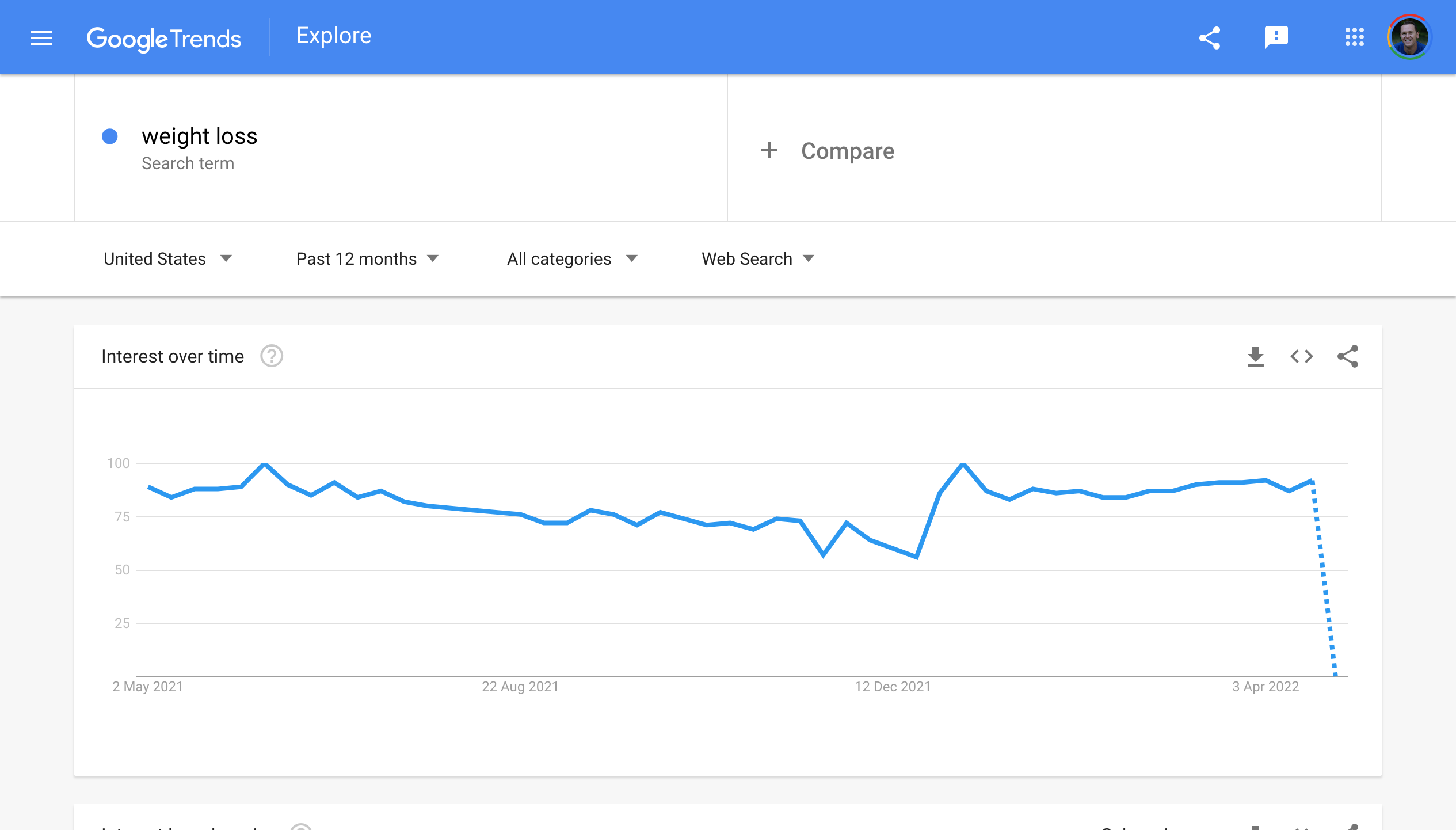
Now, inside Google Trends, you can choose if you want to do a web search, which is information pulled from Google, or you can do a YouTube search as well.
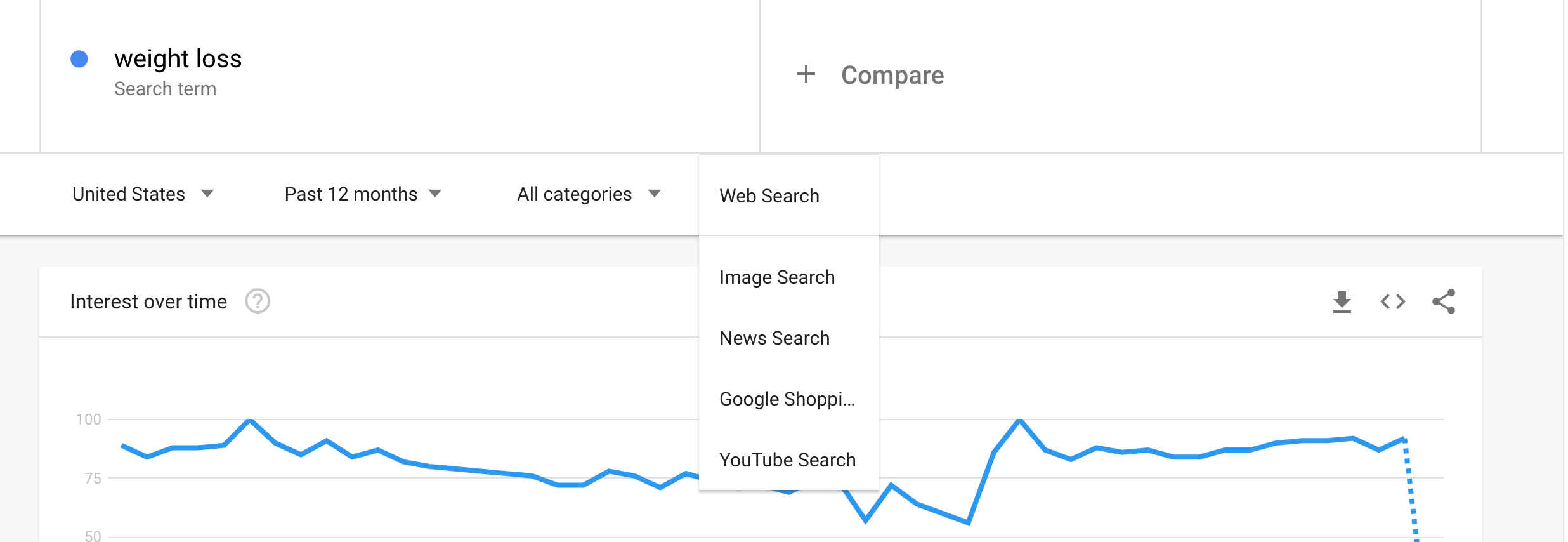
What's cool about Google Trends is that you can compare different ideas.
For example, we can compare weight loss to building muscle and you can tangibly see that weight loss is a far more popular topic than building muscle.
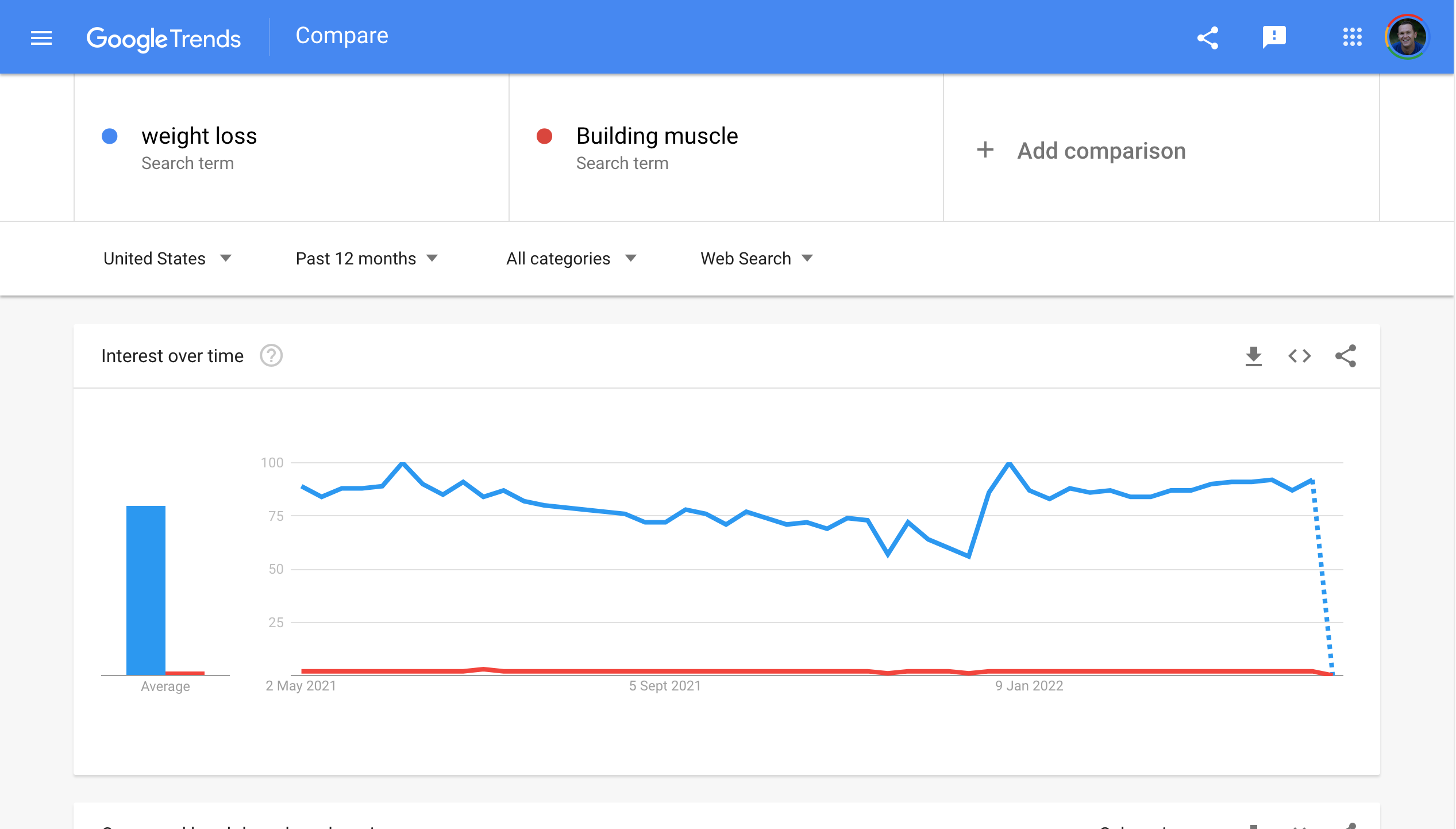
Another great tool is to use Amazon.com.
You're trying to build a business that you're passionate about and chances are somebody has written a book around the topic that you're thinking of.
When you go to Amazon.com, next to the search bar, you can choose what category you want to search in.

So for us, we want to go down to books.
Using our weight loss example, we'll type in "how to lose weight".
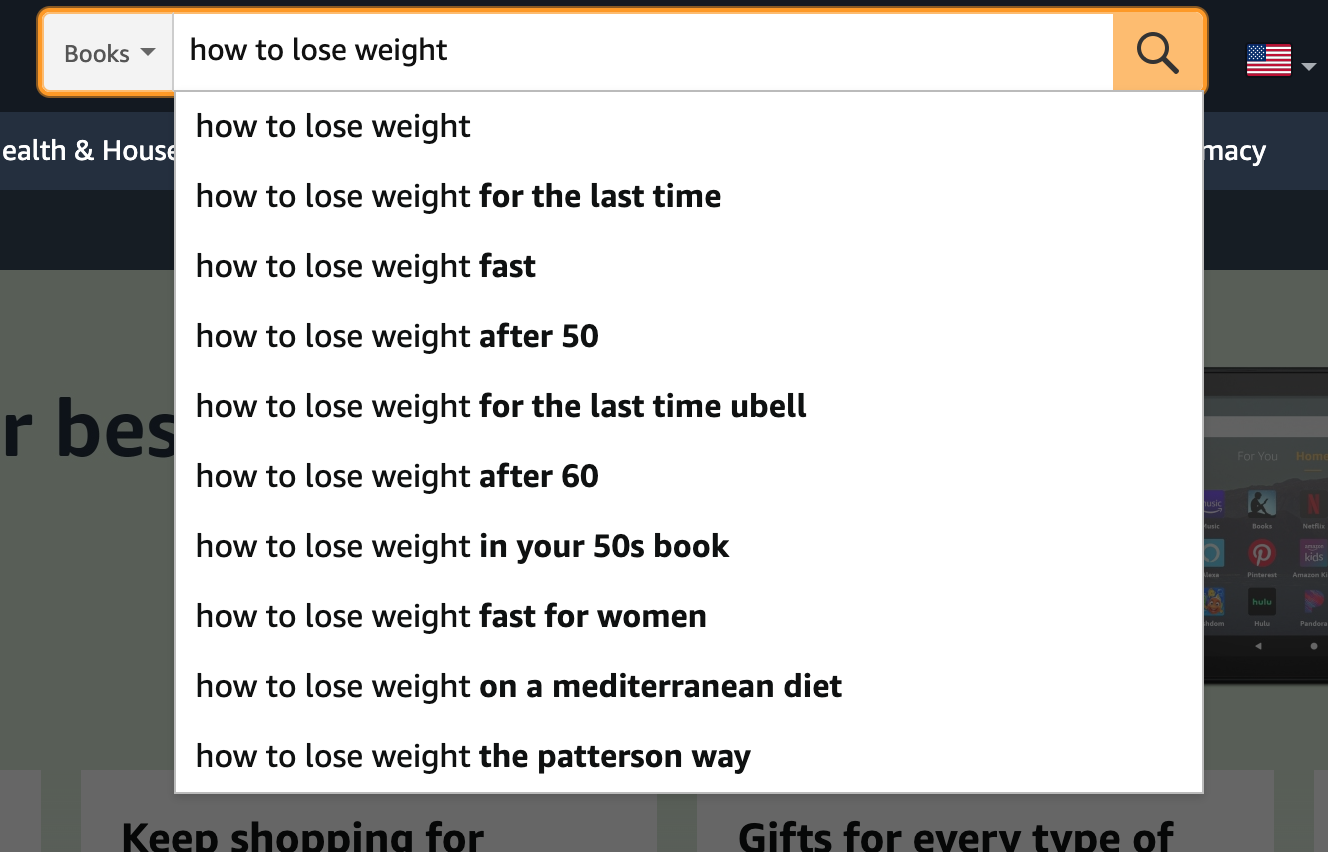
Once you've typed in your topic or niche in the search under books, go over to "sort by" and pick "most reviews".
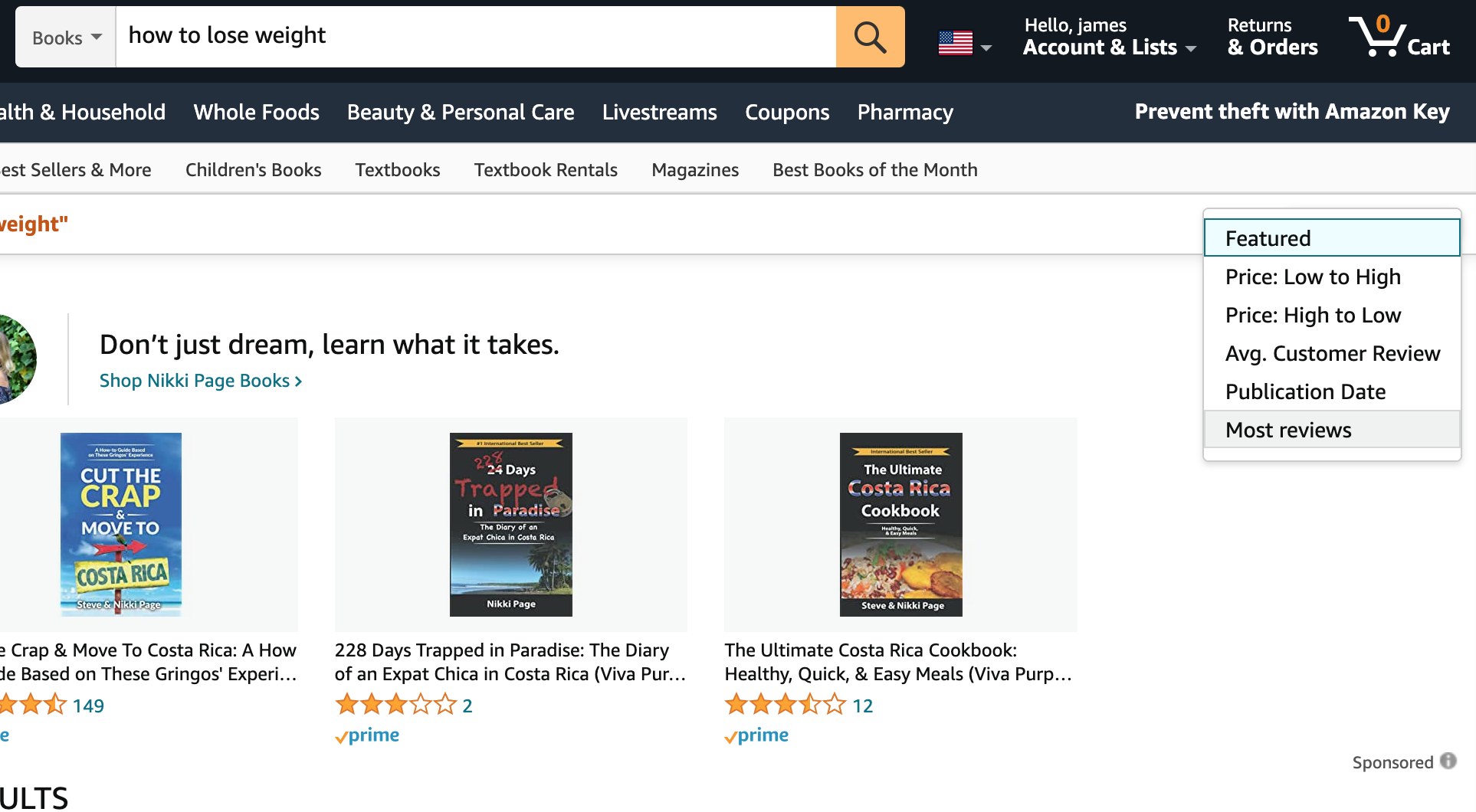
When we scroll down, we want to look at the bestsellers and see what kind of topics people are specifically interested in.
For example, when we do this search, we have "The Complete Ketogenic Diet for Beginners", "The Obesity Code", and "The Complete Guide to Fasting".
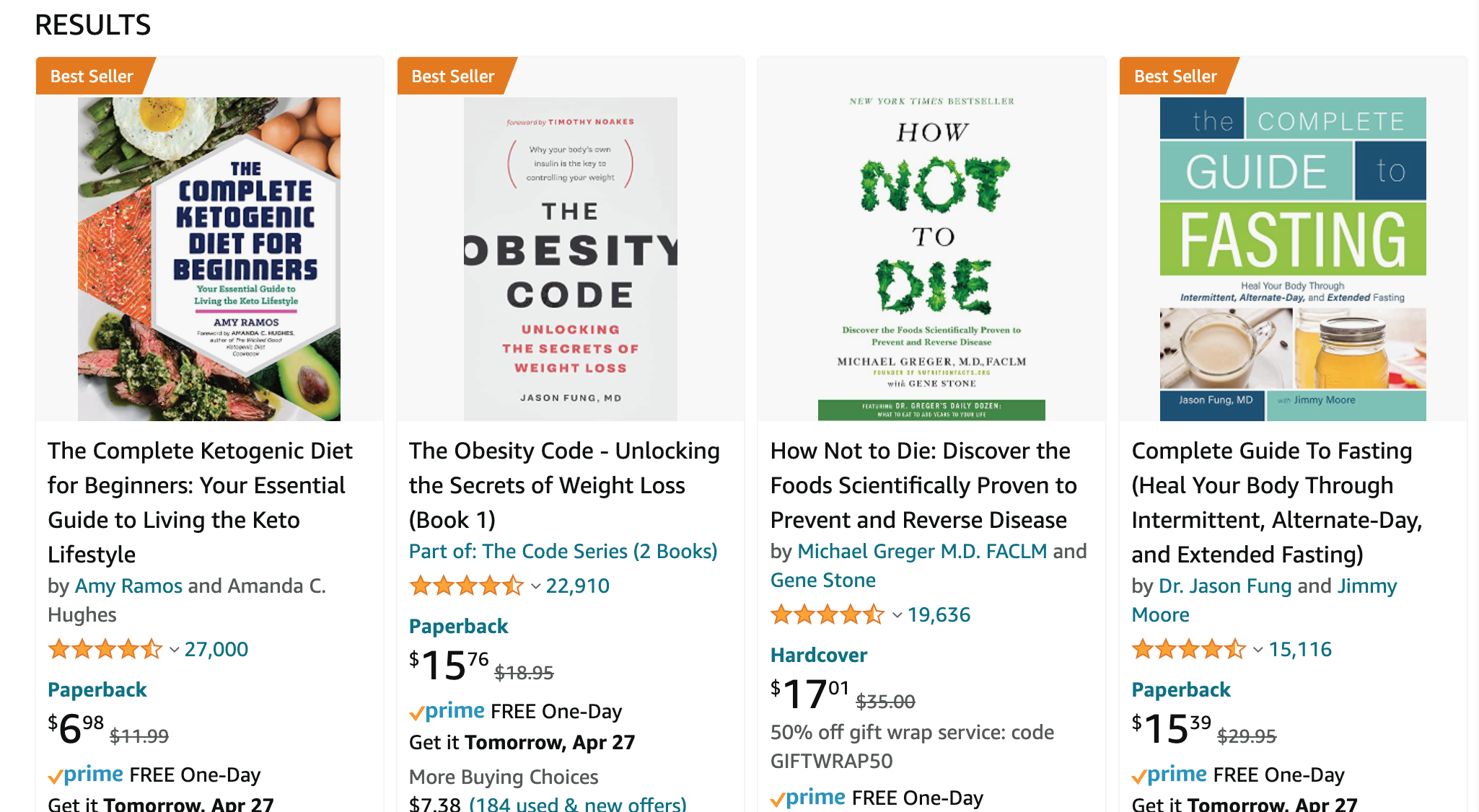
Three totally different topics around the weight loss niche, that are all bestsellers.
So if you want to pursue the weight loss niche, consider going after one of these different ideas, whether it's Fasting, Keto, or weight loss in general. This research is also great for coming up with future content ideas related to your target niche or topic.
When you look at these books, pay attention to ones with a lot of reviews.
Looking at reviews is what allows you to see what people like about these books or the way that people teach and what people don't like about the books as well.
PRO TIP: Ignore the five and one-star reviews! Rather, consider the two, three, and four-star reviews.
The middle-star reviews are going to give you unbiased feedback and are going to share with you the pros and the cons of things they like the things they didn't like inside of the book and that's going to give you a ton of ideas and feedback.
Another awesome tool that we can do the same thing with is Udemy.com.

Udemy is a website that allows you to purchase online courses and we're going to do the same thing that we did with Amazon.
So if we type in "how to lose weight", we're going to get a list of different courses, but what we want to do is sort them by most reviewed, and just like Amazon we can find more topics that people are actually paying for.
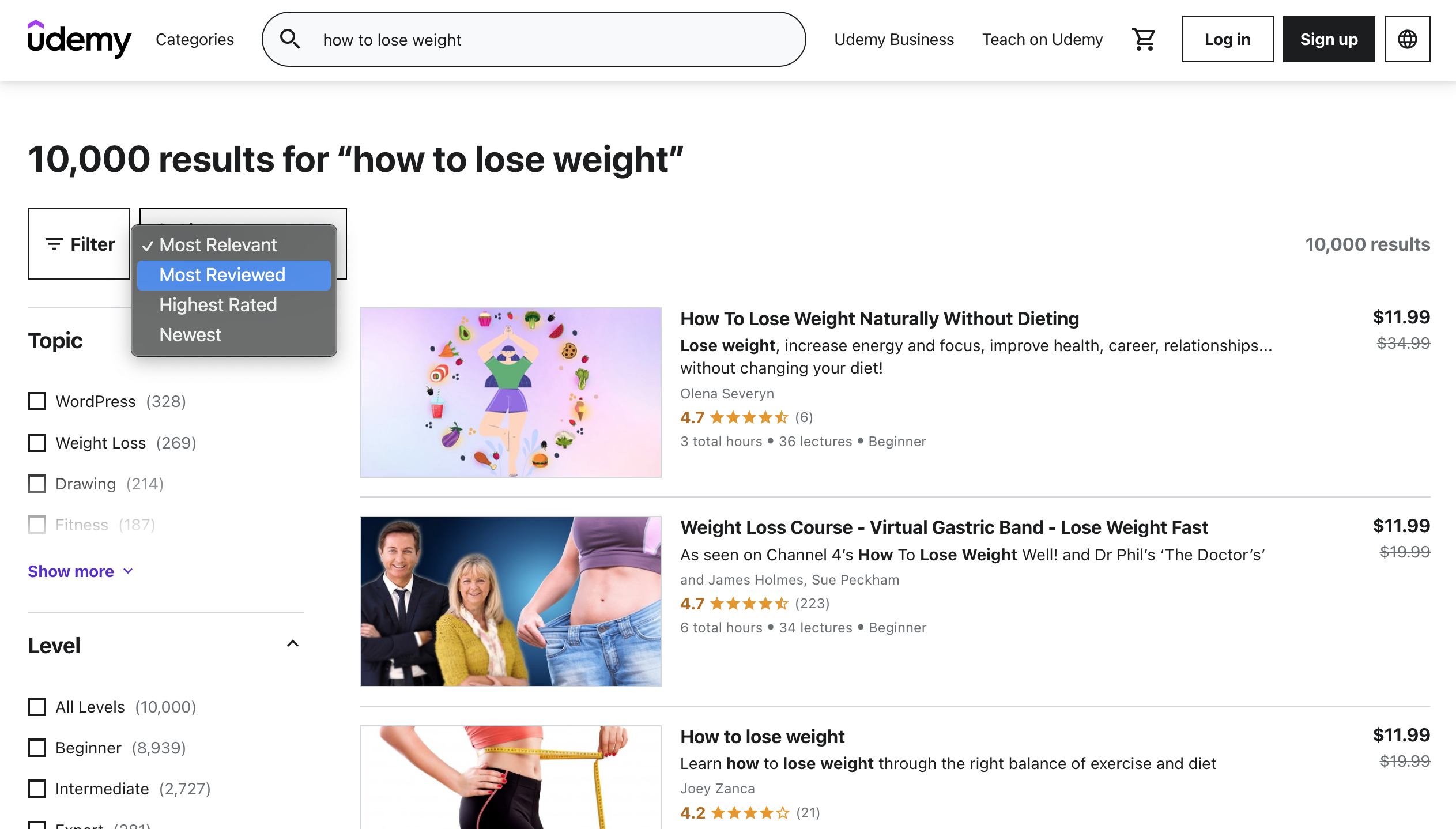
So that we can collect more feedback and help us be more confident in the right kind of business idea.
Something to think about...
As you're doing this research, do consider, "Can I actually answer the questions that people are asking?" or "Would I be willing to figure out what those answers are?"
Again, business is about solving problems.
By doing this kind of research, you can see what sort of things people are really interested in learning, and if those kinds of topics don't seem very fun to you, then it may not be the best business to pursue.
The next type of research that we want to do is Outbound Research.
Step 3 - Outbound Research
This is the research where we actually go out and have real conversations with people.
You can do this in person or online through something like Facebook or Instagram and start with your low-hanging fruit (family and friends).
When you meet with these people, and you start these conversations, position the conversation around these questions:
- What is your biggest frustration or your biggest challenge related to _____? (insert topic/niche)
- What is your biggest hope, dream, or goal related to _____? (insert topic/niche)
As you have these conversations with people jot down what they're saying and put it into an easily accessible document, whether that's a small notepad you can fit in your pocket or an online document like Google Docs.
As you start these conversations, look for both the external and the internal answers that they share with you.
For example, the external would be, "I want to lose weight".
Notice how that is surface level. What we want to do is dive into why this person wants to lose weight.
An example of the internal would be, "I have a fatal heart condition. And if I don't lose this weight, I could die and never get a walk my daughter down the aisle."
Can you see the difference between the two?
So when people do give you feedback say something like "Thank you for sharing! Could you tell me more about that?"
What if you get nothing?
If nobody's responding to your questions, and no one really seems interested in this idea, try and reframe the question into something more specific.
For example, with weight loss, you could ask, "If you could lose an extra 20 to 30 pounds, what would that do for your life? How would that make you feel?"
It may take a couple of tries at refining these different questions, but the idea is that you want to know...
- What's the Frustration
- What's the goal or dream that they have
If you've refined your questions and you're still not getting any answers, then you want to go back to that brainstorming sheet and move on to a different idea.
Most likely, it will take you some time to find that thing that you truly are passionate about, and a lot of people find valuable, so be patient with yourself.
Once you find that idea, now what you want to do is learn how to bring in leads to your business, so that you can actually serve these people.
And that's exactly what I teach you in this post on how to get quality leads.
To your success,
James
Let's Build Your Online Business. Together.
Want to Make Money Even When You're Not Working? Watch my Passive Income Masterclass and Set Up Your Automated Sales Machine!

